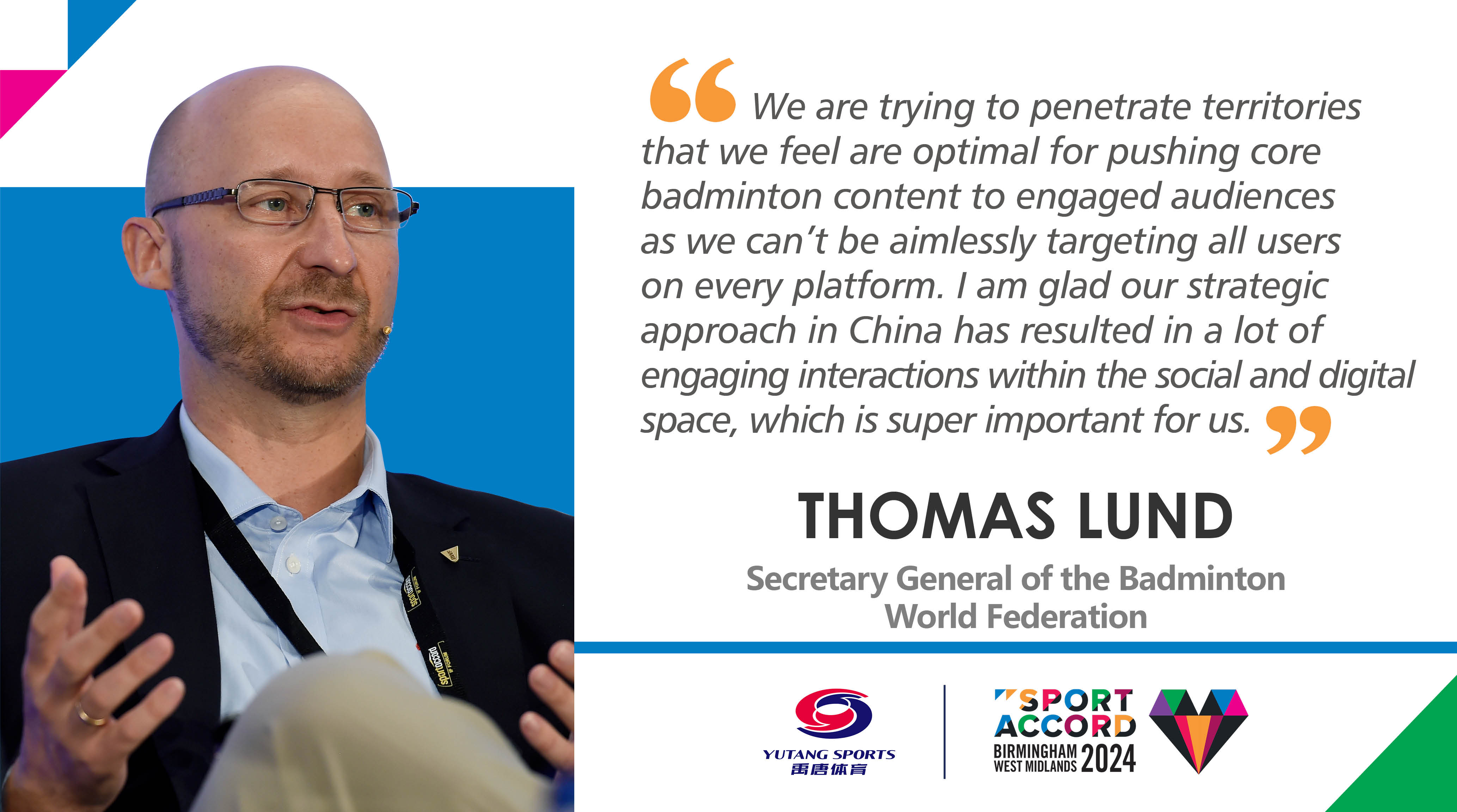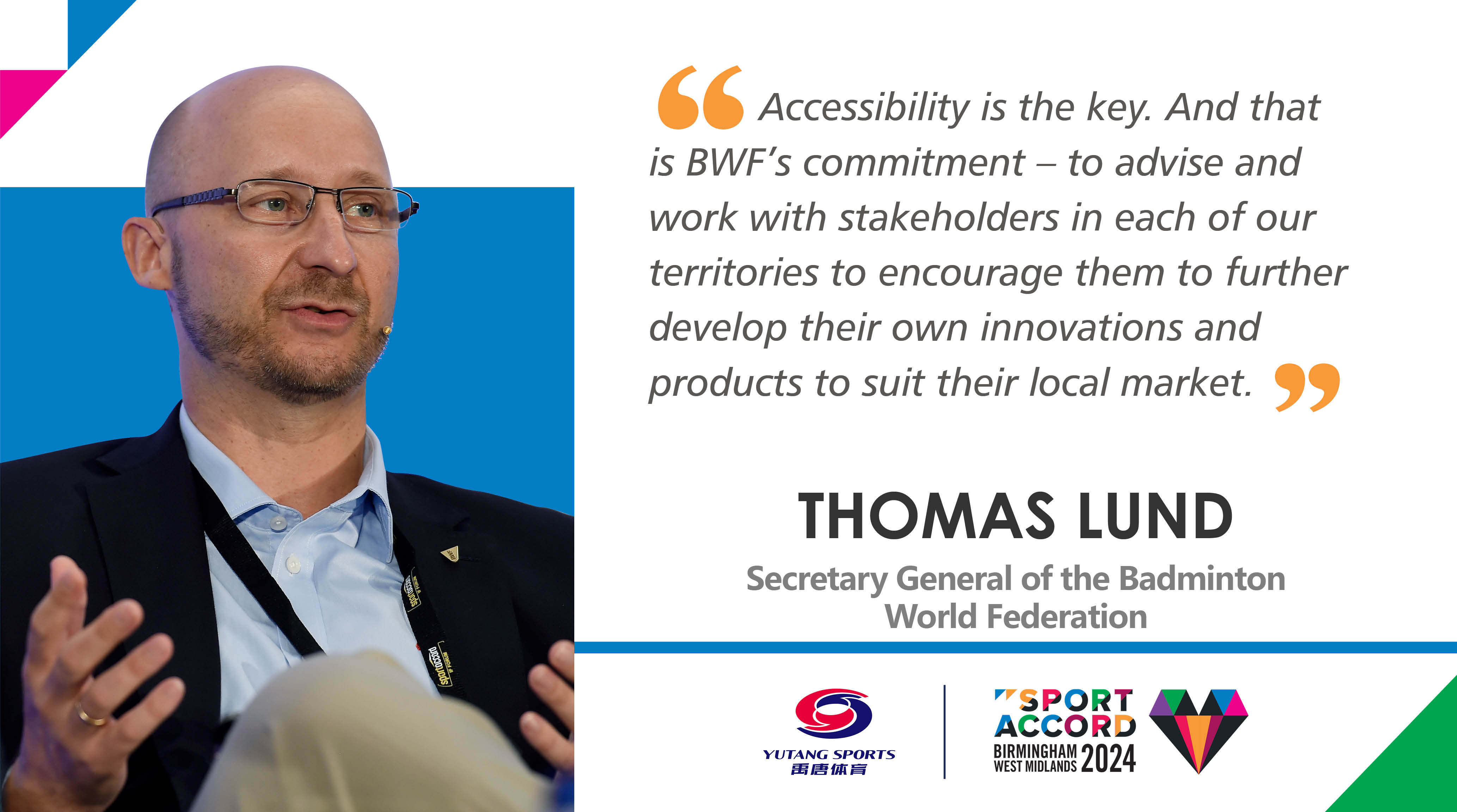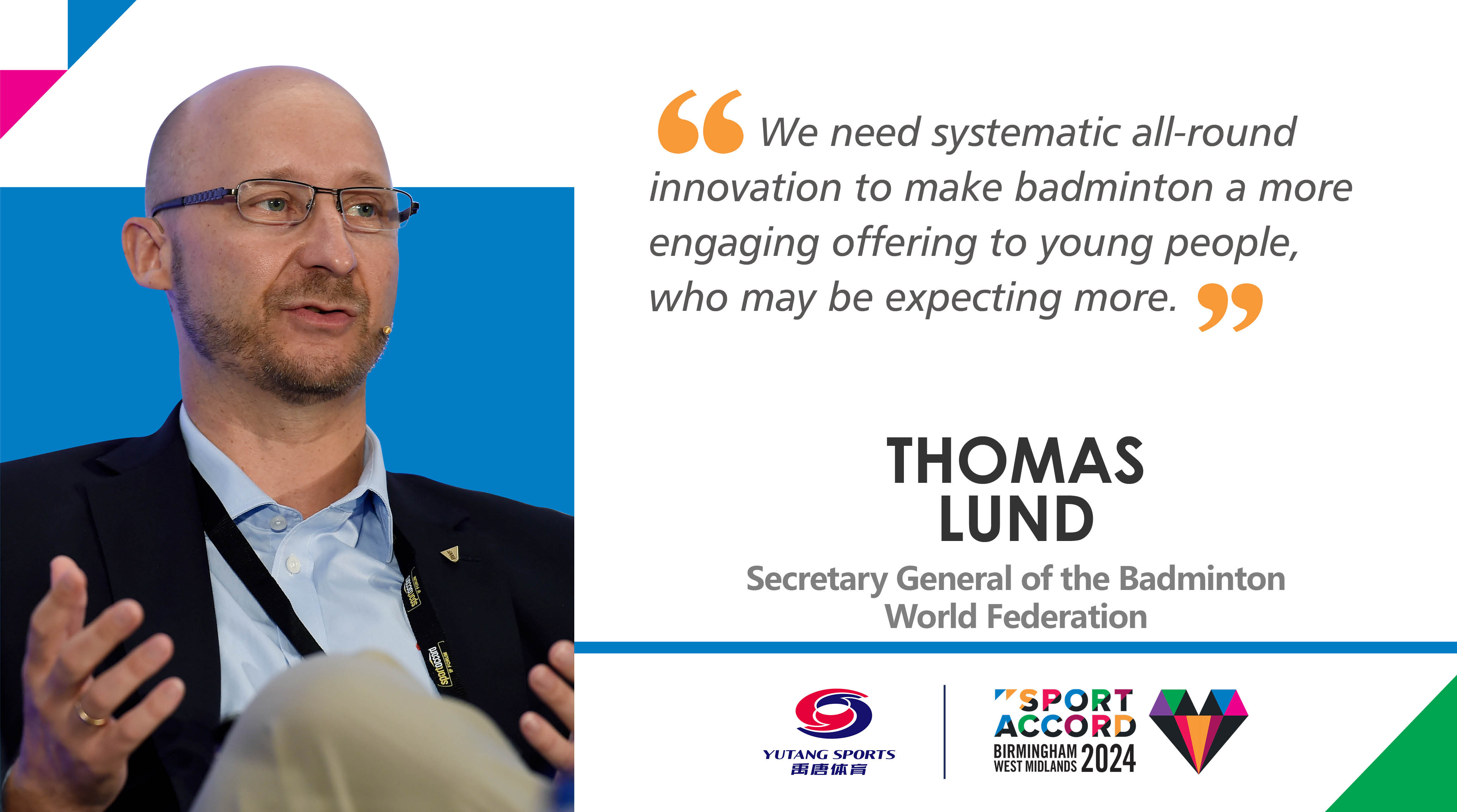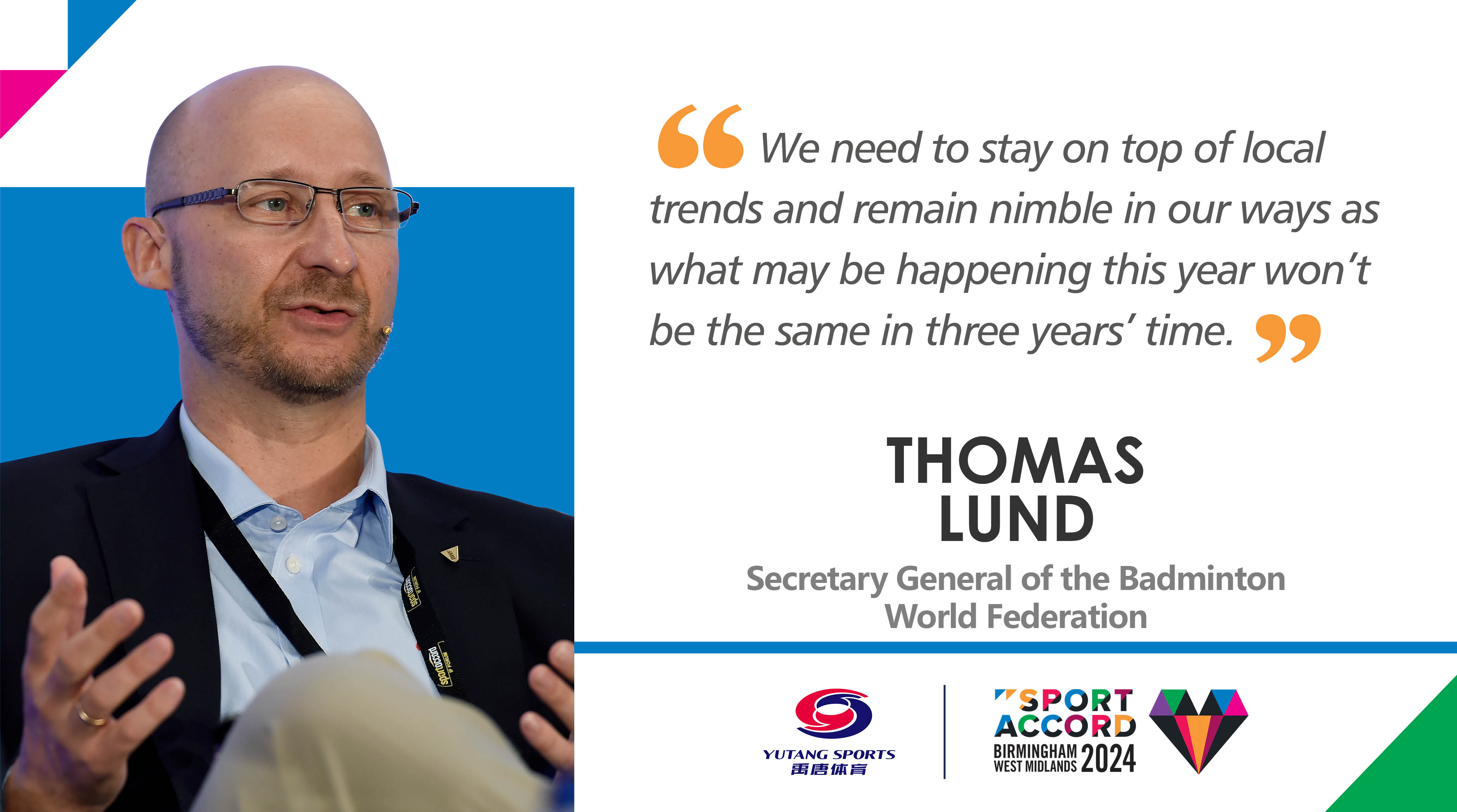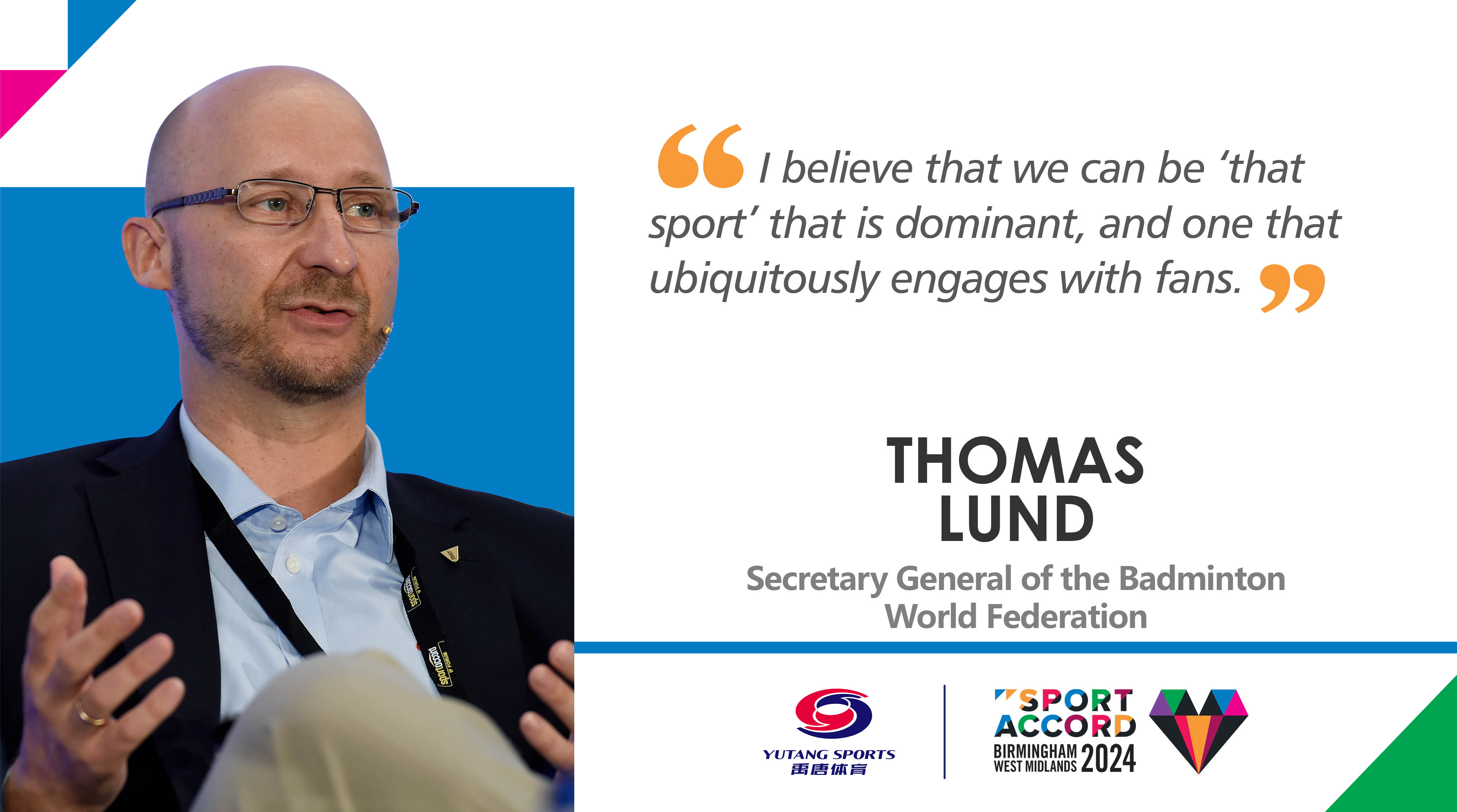From April 7 to 11, the SportAccord World Sport & Business Summit, returns in Birmingham, West Midlands, and brings together around 1,700 sporting leaders and key decision makers from over 120 International Federations, the International Olympic Committee, and organizations involved in the business of sport.
Themed at “The Power of Sport”, the Sport’s most influential gathering delivers a week-long combination of official sports meetings, social gatherings, a themed conference program and exhibition space for International Federations, industry, cities and regions to focus on the challenges and opportunities ahead for global sports community.
As one of the Principal Media Partners, Yutang Sports was honored to take an in-depth conversation with Thomas Lund, Secretary General of Badminton World Federation (BWF), who shares insights in BWF’s continuous efforts and achievements in the organization’s business development, digitalization, and Chinese market expansion.
Thomas Lund, Secretary General of the BWF, at the SportAccord 2024 (©️Yutang Sports)
Digitalization and innovation as the key principle
For any sports disciplines, to target the younger generation has become a “must-do” business, driving almost all international federations to push ahead with the digitalization strategy. The same concern goes to the governing body of badminton community.
“Our first priority is still to enable fans and participants to pick up a racket and play badminton in as many places around the world. However, to achieve this we need to reach out and engage more youth populations through social and digital platforms to get them interested in the sport and satisfy their needs as fans. Only then do we stand a better chance to get them onto the courts.”
Extensive efforts have been made by the BWF in this respect, not least in China, where, by working efficiently with its partners, the organization has brought its patterns to Chinese market through a range of different movement and attempts. While this process can never be separated from the digital frenzy within the country as well. Led by prevailing platforms like Weibo and Douyin, China remains as one of the world’s most innovative social media ecosystems, with changes happening from day to day in a large number of diverse platforms.
“We also need to carefully look at fan behaviors and trends,” added Lund, “We are trying to penetrate territories that we feel are optimal for pushing core badminton content to engaged audiences as we can’t be aimlessly targeting all users on every platform. I am glad our strategic approach in China has resulted in a lot of engaging interactions within the social and digital space, which is super important for us.”
Speaking of the mass participation of badminton, Lund also attaches great importance on the power of digital tools. “On one hand, this targeted approach based on the interests and preferences of fans is necessary, but we are also working with and advising different key stakeholders in China, including Chinese Badminton Association, on more direct-to-consumer promotions focused on grassroots badminton that could result in greater participation and publicity and increased commercial value of badminton events in China.”
In the meantime, the BWF has also initiated a series of innovative movement around its new outdoor game series, the AirBadminton, in partnership with both private companies and HSBC, BWF's Global Development Partner, to set a stage for people of all ages and ability.
“We are proactively trying to establish badminton as an outdoor game, both for recreational enjoyment but also as a competitive means. People in China have always enjoyed playing badminton outdoors, but now we have invested in a special outdoor shuttlecock and associated infrastructure to make it a more viable option to more people. We hope that AirBadminton as a unique innovation will attract younger people to the sport in more places around the world.”
Adjustments on the rules will be made, based on outdoor environment characteristic, to ensure that the game is easy and safe to play. As enthusiasts have been returning outdoor after the pandemic, the outdoor game will exist as a significant innovation by the BWF to get more people in badminton community.
“Accessibility is the key. And that is BWF’s commitment – to advise and work with stakeholders in each of our territories to encourage them to further develop their own innovations and products to suit their local market.”
To maximize accessibility and attract the young
Reforms and making changes have always been a main story line for traditional sports federations, let along the BWF, who has done extensive works to ensure that the sport remains one of the most accessible at global community, while Lund also views accessibility as one of the most prominent strengths for badminton, as the sport, which takes simple equipment and limited space, is easy for everyone to get started.
According to Lund, to maximize the accessibility could be a high priority for BWF. “One of the concerns in China is managing the high number of participants with the limited number of courts available. There is a challenge to fulfill the needs of our badminton participants and keep them interested in game, so they don’t start looking at other options for physical activity just because they can’t access a court. This is closely associated with how China and Chinese cities develop their facilities and keep up with the supply and demand.”
In the meantime, Lund also perceives the universal challenges posted for traditional sports, as the younger generation has been putting more of their attentions to emerging sports like gaming and virtual sports. But he believes that, as health has always been a main concern across all populations, physical sports would remain highly relevant to the youth, but changes are obviously necessary. As the governing body of badminton community, Lund stresses the BWF’s unique positioning and duty on how to advice. “The key is to advise all stakeholders worldwide where badminton is played that we need to innovate and stay ahead of the curve to keep badminton relevant for all groups.
“Rather than it just being a simple exercise of playing badminton, we must look at ways to increase the entertainment value, and possibly add other elements to make it a more engaging offering to young people, who may be expecting more.
“This should be a systematic, all-round approach, where such innovation is applied to all levels including coaching and training, whereby the accessibility and social appeal of the sport makes it exciting for people to join a community.”
For the BWF as the governing body, the key is to advise all its stakeholders to manage and develop the sport, with effective approaches that adapt to differences between countries.
Follow the new trends
For any international federation, to enhance the sport’s commercial value across global market is always an essential job, and so does the BWF. According to Lund, trends tend to be diverse in different markets in terms of how badminton evolves and thrives. What happens particularly in Chinese market is the growing diversity of media landscape, which is clearly a strength for stakeholders and somewhat a challenge as well due to the increasing complexity of the relevant approaches.
Lund also admits that the organization needs to adapt to changes on market trends and consumer behaviors. “The most important thing we have learned, particularly in the China market, is to stay on top of local trends and remain nimble in our ways as what may be happening this year, won’t be the same in three years’ time.”
Fickle as the market is, what always remains perpetual and vital to the BWF is the commercial benefits and business values of the sport, especially in a growing professional world where the organization has an increasing prize money for players to improve their income level.
“Commercialization certainly helps our sport become a more interesting product for fans and stakeholders and has seen the business side of our operations evolve tremendously,” says Lund, “Clearly, it's necessary for the BWF to make badminton commercially appealing to prospective sponsors and partners to open up new doors for growth and opportunity.”
Badminton as “the sport” in China
With the HSBC BWF World Tour Finals being settled in Hangzhou for four consecutive years until 2026, the TotalEnergies BWF Sudirman Cup Finals 2025 confirming Xiamen as the host city, as well as the latest BWF Thomas & Uber Cup Finals, ended on 5th May, creating frenzy in Chengdu, the Chinese market has been undeniably showcasing its value and attractiveness to the BWF and its top events.
Speaking of the organization’s attention to the market, Lund highly values China as an ideal place with elite players and considerable fanbase that follow the sport throughout the year, creating fertile soils for badminton events at all levels.
“Although it is not feasible to have a tournament in China every week, we are very excited to see such an extreme demand from fans to watch live elite badminton. This gives us great confidence and optimism to keep bringing top-level tournaments to China on a regular basis.”
To make badminton “the sport” in China – an ambitious mission to be completed by Lund. “I believe that we can be ‘that sport’ that is dominant, and one that ubiquitously engages with Chinese people, because I know that Chinese fans understand the potential for badminton. There is no reason why more Chinese players, and global players, can transition to being household stars in their home market. We already have several players with superstar status, but we can do better.”
About SportAccord World Sport & Business Summit
The SportAccord World Sport & Business Summit brings together around 1,500 leaders and key decision makers from over 120 International Federations (IFs), the International Olympic Committee, and organisations involved in the business of sport.
The Summit provides an unrivalled platform enabling global business leaders and host cities to have access to all the International Federations and their stakeholders in one location over several days.
This unique event is a combination of official sports meetings, networking gatherings, a themed conference programme, and exhibition space enabling International Federations, industry, cities and regions to showcase and advance their sport, services and facilities.
About SPORTACCORD
SportAccord is a sports event organisation based in the Olympic Capital, Lausanne, Switzerland, and governed by stakeholders representing the Olympic and non-Olympic International Federations.
It brings together International Federations and organisations involved in the business of sport with the aim to serve, promote and protect the common interests of its stakeholders, help them achieve their global objectives and facilitate knowledge-sharing.
SportAccord’s stakeholders include:
ASOIF (Association of Summer Olympic International Federations)
WOF (Winter Olympic Federations)
ARISF (Association of IOC Recognised International Sports Federations)
AIMS (Alliance of Independent Recognised Members of Sport)
Visit SportAccord.sport for more information.
About Yutang Sports
As one of SportAccord's Principal Media Partners, Yutang Sports is a Chinese leading sports marketing and media platform, with an ultimate mission to connect China and world through sports. After years of growing, Yutang Sports, with a comprehensive media and marketing promotion system, is now dedicating to reporting sports business and marketing trends, providing sports business news, analysis, and exclusive data reports in both Chinese and English. Having been cooperated with top-level domestic and international sports summits, Yutang Sports is opening a window for Chinese sports industry to embrace the world.

